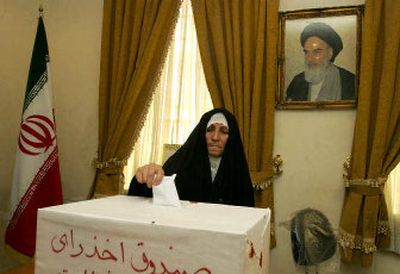Voting heavy in Iran’s presidential election

TEHRAN, Iran – Iranian voters streamed to polling stations Friday, snubbing dissidents’ calls for a boycott in the closest presidential race since the 1979 Islamic Revolution. Results will decide who inherits a long list of challenges, including nuclear talks with the West and demands for reform at home.
Turnout appeared stronger than expected and polls stayed open an extra four hours, with voting booths even set up at Tehran’s main cemetery for those paying weekly visits to family graves. But the contest could still end with no clear winner, forcing a runoff next week.
Some credited U.S. denunciations of the election for goading more Iranians to cast ballots after a Western-style campaign that has reshaped Iranian politics. A runoff would almost certainly include front-runner Ayatollah Hashemi Rafsanjani, a political veteran and leader of the Islamic Revolution who now portrays himself as a steady hand for uneasy times.
The bigger question is how voters will treat his main rivals: a former police chief backed by conservatives, and another allied with outgoing President Mohammad Khatami’s stumbling reform movement.
Results were expected today. If no candidate clears 50 percent, the top two vote-getters will face another ballot next Friday.
In the impoverished area of south Tehran, women in black chadors waited up to 30 minutes to vote. In posh northern suburbs, young women in colorful head scarves and bright lipstick called friends on cell phones to urge them to vote. Ballot stations were set up in shrines as well as the cemetery.
Helicopters ferried ballot boxes to nomads in their summer pastures. In the blistering plains near the Gulf, election officials used palm branches to make shade for voters waiting in temperatures that surpassed 100 degrees.
Voting was extended for four hours because of long lines. A strong turnout was believed likely to benefit both Khatami’s protege, Mostafa Moin, and Rafsanjani, 70, who served as president from 1989-97 and later became a top adviser to the theocracy.
“Fight the enemy by casting a vote,” said Iran’s Supreme Leader Ayatollah Ali Khamenei – head of the non-elected Islamic theocracy whose near-absolute power can override both the president and parliament.